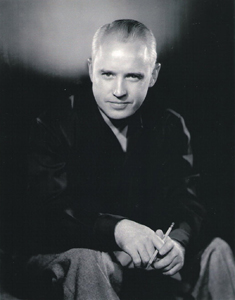 This Goodly Land
This Goodly Land
William Bradford Huie (November 13, 1910–November 22, 1986)

Alabama Connections
- Hartselle, Morgan County: birthplace, childhood residence, adult residence
- Tuscaloosa, Tuscaloosa County: education
- Birmingham, Jefferson County: adult residence
- Guntersville, Marshall County: place of death
Selected Works
- Huie, William Bradford. Mud on the Stars: A Novel. New York: L. B. Fischer, 1942. Rpt. New York: New American Library, 1955. Rpt. Tuscaloosa: University of Alabama Press, 1996.
- Huie, William Bradford. Can Do! The Story of the Seabees. New York: E. P. Dutton, 1944. Rpt. Annapolis, Md.: Naval Institute Press, 1997.
- Huie, William Bradford. The Execution of Private Slovik: The Hitherto Secret Story of the Only American Soldier Since 1864 to Be Shot for Desertion. New York: Duell, Sloan and Pearce, 1954. Rpt. New York: Delacorte Press, 1970. Rpt. Yardley, Pa.: Westholme, 2004. New York: Delacorte Press, 2004.
- Huie, William Bradford. The Americanization of Emily: A Novel. New York: Dutton, 1959.
- Huie, William Bradford. Three Lives for Mississippi. New York: WCC Books, 1965. Rpt. Jackson: University Press of Mississippi, 2000.
- Huie, William Bradford. The Klansman. New York: Delacorte Press, 1967.
- Huie, William Bradford. He Slew the Dreamer: My Search, with James Earl Ray, for the Truth about the Murder of Martin Luther King, Jr. New York: Delacorte Press, 1970. Rpt. Montgomery: Black Belt Press, 1997.
Literary Awards
- Alabama Author Award, Alabama Library Association, 1977, for In the Hours of the Night: A Novel
Biographical Information
William Bradford Huie was born and raised in Hartselle, Ala. He attended the University of Alabama, graduating with an AB in 1930 (he later earned an MA, as well). From 1932 to 1936, Huie worked as a reporter for the Birmingham Post. From 1941 to 1943, he was the associate editor for the magazine American Mercury in New York. Huie served in the U.S. Navy from 1943 to 1945, then returned to American Mercury after the war and was its editor and publisher from 1945 to 1952. From mid-1951 through mid-1953, he was a regular interviewer on the CBS television program Chronoscope, a predecessor to news interview shows like Meet the Press and Face the Nation.
Huie began writing and publishing books in the 1940s. His first novel, Mud on the Stars, was published in 1942, as was his first nonfiction book, The Fight for Air Power. He continued to publish while serving in the Navy and drew on his military experiences for both his novels and his nonfiction books. Huie began writing books on civil rights issues in the 1950s. Wolf Whistle described the murder of Emmett Till, while Three Lives for Mississippi told the story of the murders of three civil rights workers. His novel The Klansman inspired death threats, and a cross was burned on the lawn of his Hartselle home. He Slew the Dreamer was the story of James Earl Ray, the man who assassinated Martin Luther King, Jr. Unafraid of controversy, Huie was working at the time of his death on a book about the Alabama National Guard’s involvement in the 1961 Bay of Pigs incident.
Interests and Themes
William Bradford Huie wrote on controversial topics in a strong reportorial style. He was one of the most prominent proponents of “checkbook journalism,” the practice of paying for interviews. In his view, it was better to pay for interviews than to let the stories go untold.
For More Information
Please check your local library for these materials. If items are not available locally, your librarian can help you borrow them through the InterLibrary Loan program. Your librarian can also help you find other information about this author.
There may be more information available through the databases in the Alabama Virtual Library. If you are an Alabama citizen, AVL can be used at your public library or school library media center. You can also get a username and password from your librarian to use AVL at home.
Reference Articles
- Richardson, Riché. "’The Birth of a Nation’hood’: Lessons from Thomas Dixon and D. W. Griffith to William Bradford Huie and The Klansman, O. J. Simpson’s First Movie". Mississippi Quarterly 56.1. (2002): 3-31.
Reference Web Sites
- Woodham, Rebecca. "William Bradford Huie". The Encyclopedia of Alabama. 2008. Alabama Humanities Foundation and Auburn University. http://www.encyclopediaofalabama.org/face/Article.jsp?id=h-1547.
Location of Papers
- Ohio State University
Photo courtesy of Martha Hunt Huie.
Last updated on May 30, 2008.